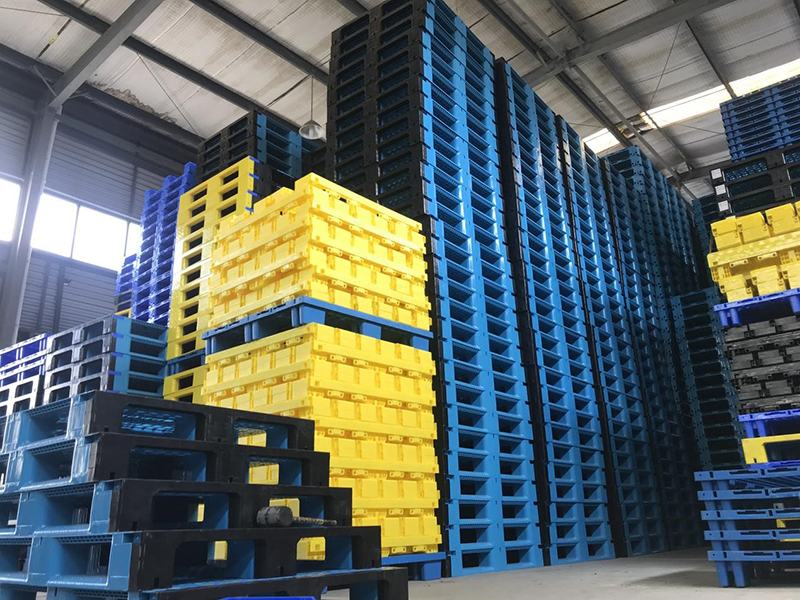
Are you considering making the switch to plastic pallets? This detailed guide explores the key advantages: durability, safety, and sustainability. Before you decide, let's dive into how plastic pallets stand up to repeated use, the safety features they offer, and their contribution to greener operations.
Key Highlights:
- Plastic pallets offer remarkable durability, lasting up to ten times longer than wooden pallets, and they are less prone to risks such as nails or splinters, providing a safer handling experience.
- These pallets come in diverse designs to cater to different needs, including nestable, rackable, and export pallets, enabling efficient storage, secure racking systems, and hassle-free international shipping.
- Sustainability is a significant advantage of plastic pallets, as they are made from recyclable materials and can be easily recycled at the end of their lifespan, contributing to a circular economy. Furthermore, their production is energy-efficient, further enhancing their eco-friendly credentials.

The Advantages of Plastic Pallets:
Plastic pallets combine strength and lightness, ensuring reliable performance and safeguarding your goods. Their durability surpasses wooden pallets by up to tenfold, offering a greater return on investment and reducing the risk of injuries associated with splinters or nails.
Safer manual handling is another remarkable advantage, as the design of plastic pallets eliminates the hazards linked to nails or splinters, thus reducing the chances of worker injuries. Additionally, their resistance to moisture, weak acids, and alkalis makes them versatile for various storage conditions, guaranteeing the safety and security of your products.
Durable and Long-lasting:
The secret behind the durability of plastic pallets lies in their high-density polyethylene (HDPE) or polypropylene (PP) composition. These materials provide the necessary robustness for repeated use, allowing the pallets to withstand heavy loads without compromising their integrity. While the initial cost of plastic pallets may be higher, their longevity and resistance to damage make them a cost-effective solution in the long run.
Lightweight and Easy to Handle:
Plastic pallets boast a lightweight design. This reduced weight facilitates easier manual handling and the use of equipment like forklifts, even when carrying heavy items. Moreover, the design and materials of plastic pallets eliminate the risk of loose components that could cause injuries during lifting, contributing to a safer working environment.
Resistant to Pests and Moisture:
Plastic pallets shine in industries that prioritize hygiene, as their smooth and non-porous surface resists bacteria and contaminants, making them an ideal choice for the food and pharmaceutical sectors. Additionally, they are also resistant to acids and alkalis, enhancing their suitability for various storage environments.
Going Green with Plastic Pallets:
Plastic pallets are not only efficient tools for shipping and storage but also play a vital role in promoting sustainability. Their longevity, lasting up to ten times longer than wooden pallets, reduces waste and enhances sustainability. When their service life ends, plastic pallets can be recycled instead of being sent to landfills, aligning with the global push towards a circular economy.
Furthermore, the production of plastic pallets often incorporates recycled materials, further diminishing their overall environmental footprint. Many plastic pallet suppliers always offer 100% recycled plastic pallet options that comply with ISPM 15 regulations, ensuring eco-friendliness without compromising international shipping standards.
The recycling process for plastic pallets is straightforward, involving the collection, sorting, shredding, and granulating of the plastic, which is then reused to create new products. This recycling process not only benefits the environment but also contributes to the economy by creating jobs, reducing waste management costs, and supporting the market.
Eco-friendly Materials
Plastic pallets often boast impressive green credentials, thanks to the environmentally-friendly materials used in their manufacture. Many are crafted from recycled materials, minimizing the need for new, virgin plastics and thus reducing environmental impact. In contrast to the concerns raised by some traditional manufacturing methods, these green practices represent a step in the right direction, leaving behind the cautionary signs of less sustainable options.
The materials used for recycled plastic pallets include a mix of defective pallets and other plastic waste, such as bottle tops. Utilizing these recycled materials helps to lower environmental impact and demonstrates a commitment to sustainability. Plastic pallets can be reprocessed to create new products, establishing a closed-loop system that prevents contribution to landfill waste.

Easy Recycling
Recycling plastic pallets is a straightforward process that supports environmentally friendly practices. These pallets are designed with recyclability in mind, maximizing their utility throughout their life cycle.
The recycling process involves the following steps:
- Collection of used plastic pallets, regardless of their shapes, sizes, colors, and conditions, typically sourced from large facilities.
- Sorting the pallets based on their plastic composition.
- Shredding the pallets into smaller pieces.
- Blending the shredded plastic to ensure consistency.
- Granulating the plastic into small pellets.
- Removing any metal components from the plastic.
- Recycling the plastic pellets to create new plastic products.
This recycling process is not only eco-friendly but also contributes to the economy by creating jobs, reducing waste management costs, and supporting the market.

Energy-efficient Production
The production of plastic pallets offers several benefits:
- It is eco-friendly
- It is energy-efficient
- Life-cycle assessments take into consideration their extended life cycle
- They have lower environmental impacts from emissions and resources consumed during production.
